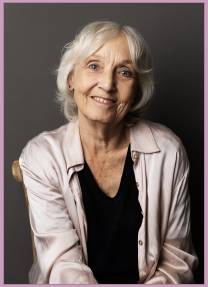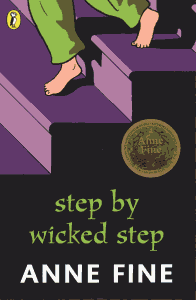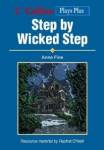

Children's Laureate 2001-2003
Carnegie Medal 1989, 1992
Whitbread Award 1993, 1996
Guardian Fiction Award 1990


Children's Laureate 2001-2003
Carnegie Medal 1989, 1992
Whitbread Award 1993, 1996
Guardian Fiction Award 1990

Read and weep . . .
One stormy night, five stranded schoolchildren uncover the story of Richard Clayton Harwick — a boy who many years ago learned what it was like to have a truly wicked stepfather. But the children have stories of their own step-parents to tell — stories that have warmth and humour, as well as sadness, and a fair share of happy endings.
Shortlisted for Sheffield Children's Book Award, 1996
Shortlisted for Lancashire Children's Book Award, 1996
Since writing the book, Anne has also turned it into a play, which BBC Radio broadcast on Radio 3 in 2003.
![]() The first book I ever wrote about families not getting on too well was Madame Doubtfire. That was about parents and children after divorce. In my next book, Goggle-Eyes, I added the complication of a sort of stepfather figure, mum's boyfriend, Gerald Faulkner - or Goggle-eyes - whom young Kitty just can't stand at the beginning of the book, but comes to like quite a bit more towards the end.
The first book I ever wrote about families not getting on too well was Madame Doubtfire. That was about parents and children after divorce. In my next book, Goggle-Eyes, I added the complication of a sort of stepfather figure, mum's boyfriend, Gerald Faulkner - or Goggle-eyes - whom young Kitty just can't stand at the beginning of the book, but comes to like quite a bit more towards the end.
The book was a success. But for the first time in my life, I started getting letters of complaint from some young readers. "I really loved your book. But then I thought your ending was a total cop-out. Because I have a stepmother (or stepfather, or stepbrother, or whatever), and I shall never, ever get to like him."
So I decided to write about stepfamilies - official ones, where everyone's married again, and unofficial ones, where Mum has a boyfriend or Dad has a girlfriend.
The trouble was that they're all different. When mixed families work, they can be just as interesting and strong and steady as any other family. But when they don't work, they can make life even more difficult and miserable for the children in them than a plain unhappy family. And that's because you can be trapped under the same roof as someone you didn't choose, you don't even like, and who isn't even a relation. It all seems so doubly unfair.
We have five stories on radio. (Six in the book.) The saddest by far is the old, old story of Richard Clayton Harwick, which the children find in a secret room, written in his old-fashioned curly handwriting in an old journal covered in cobwebs and dust, left untouched for a hundred years.
It's up to you to decide who, out of all the other children, has the easiest and the hardest time. Who's managing things badly, or well. Pixie has to deal with two really irritating stepsisters and father who pretends he doesn't notice how difficult things are for her. Claudia feels disloyal to her mum whenever she has a good time with her father and his new girlfriend. Colin had someone he thought of as his father, and now he misses him so badly it hurts. Ralph's life, though merry, is as complicated as a maze.
One of the things we realise, as we get to know the children, is that they can't depend on their parents to notice how hard they've made things. And just how much those same children aren't telling their parents about their real feelings.
I wondered about this. I wondered if, because life's complicated for the parents, too, they just didn't have the spare energy to look around and see how difficult it was for their children. Or if they couldn't face it. Or didn't care. "This is what I want next, and you lot will just have to fall in with it."
I still don't know. All I know is, it was the hardest book to write. I'm the writer, and once or twice it even had even me in tears. I think it's truthful. In places, it's painful. But there's one thing I know from the letters I get now. Children who come from families as complicated as these find the book a great comfort ("It was so good to know I'm not the only one!")
And children who don't come from bust-up and remade families will learn an awful lot about their friends who do, and the world around them.
Oh, and do settle down to listen straight away, because Step by Wicked Step starts with a brilliant BBC thunderstorm raging around creepy old Harwick Hall. You certainly don't want to miss that.
Have a good read or listen!![]()

Anne Fine has also written a message about Step by Wicked Step for teachers and other adults.
"For children who have some similar experience, this novel will be therapeutic; for those who haven't it's an absorbing read, to make them laugh and cry"
Sunday Telegraph
"Adult readers will surely also enjoy this funny but riveting book"
The Independent
Step by Wicked Step is a book for older children. It was first published in 1995.

Buy Step by Wicked Step from ![]() :
: